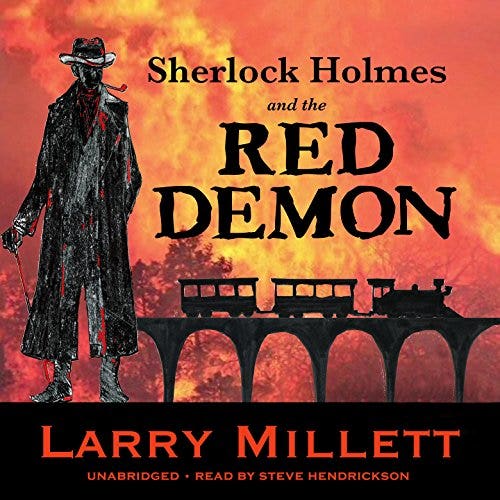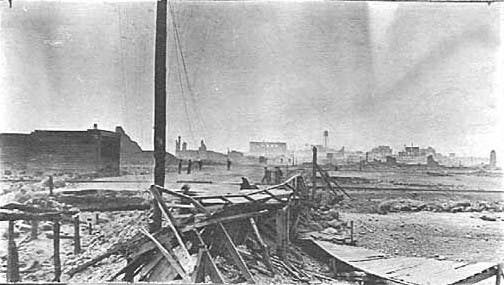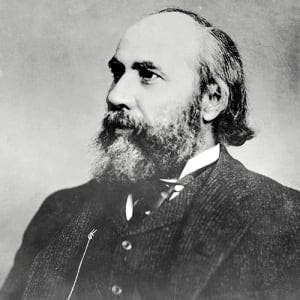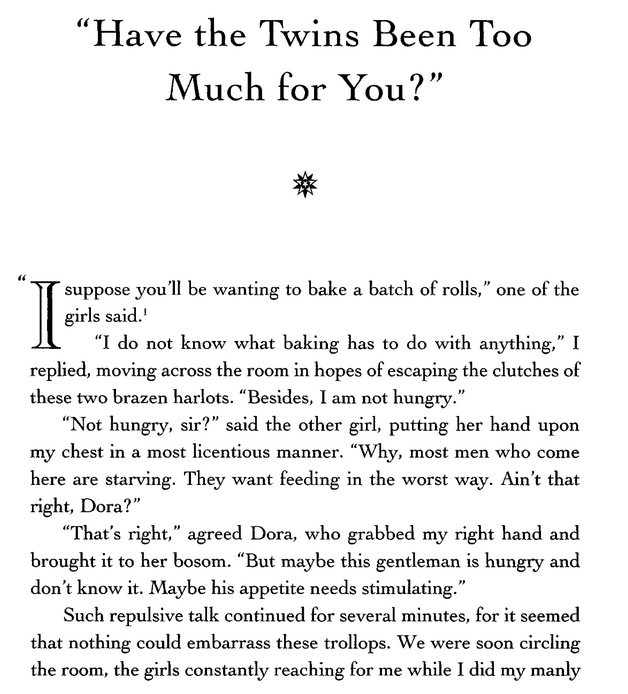Sherlock Holmes and the Red Demon: a Minnesota Mystery, a pastiche by Larry Millett, published 1996

so if i told you there was entire series of Sherlock Holmes pastiches that involved Holmes hanging out in Minnesota for a few years what would you say? "why is the famed English detective solving crimes in the middle of the northern United States?" comrade your guess is as good as mine, but probably because the author lives in Minnesota.
this series of books are pastiches built upon the premise that several unpublished Holmes stories penned by Watson were discovered inside of a wall of a historical building while it was under construction. the note left by Watson himself along with these manuscripts was that these stories contained too many unpalatable elements or dealt with their involvement in historical events both he and Holmes felt would be better left out of any publication. this isn't a bad set up for your pastiche i have to admit.
for the record, a pastiche is "a literary, artistic, musical, or architectural work that imitates the style of previous work" according to the Merriam-Webster dictionary. due to Watson being the point of view character, it makes it much easier for authors to establish their Sherlock Holmes story as a pastiche.
my biases
this book interested me as one of the first pastiches i got when i got my library card last year. living in Minnesota myself, this was a really interesting pastiche on it's setting alone. i've seen pastiches and adaptations where Holmes is in America for whatever reason, but he usually sticks to the largest metropolitan locations of the late 19th to early 20th centuries. there was a lot of exciting mysteries that could be told about Chicago or New York for example.
the detriment to maybe my enjoyment of this book is that i'm not a native Minnesotan, i'm not as familiar with the local history of the state as say someone who was raised here through their younger education days. i can't say that i know the history of the areas i was raised in like the back of my hand, but there are a few tidbits i could certainly pull better than the total amount of historical knowledge i have of Minnesota. hell, i remember more facts about the state of Vermont than i do about Minnesota and thats because i did a school project about Vermont in 5th grade.
i bring up Minnesota history because The Red Demon focuses around a real event that happened, The Great Hinckely Fire that occurred in September 1894. at least 200,000 acres was burned down and the official death toll was 418, though it was likely higher, attributed a lot to lack of recording of the deaths of the indigenous people and off the grid people living in that area. it is considered among one of the deadliest fires in Minnesota history. Sherlock Holmes and the Red Demon sure is the most historical historical fiction it can be.
 a black and white photograph of the aftermath of The Great Hinkley Fire
Ruins of downtown Hinckley after the 1894 fire Source
a black and white photograph of the aftermath of The Great Hinkley Fire
Ruins of downtown Hinckley after the 1894 fire Source
the official reason for the fire was determined as a severe two month drought and due to the sparks that flew from the wheels on rails throughout the region, a fire was inevitable. There's more about the specific details of the fire on the City of Hinckley website. this story posits, even in it's own fictional way, that the fire was started due to an act of arson.
an incomplete summary
i'm gonna be real, i listened to the audiobook close to a year ago so my ability to recall the details is mostly relegated to the larger set pieces of the book and pieces of the book i can find online to refresh my memory. i'd rather not go through the trouble of rereading or relistening to the entire book again, my apologies there but you'll see why i did this.
beyond the introduction i mentioned earlier, The Red Demon begins with Holmes being hired by railroad baron James J. Hill to track down a murderous arsonist calling himself The Red Demon that threatens his railway through several letters. the letters were a dead end for local authorities as they asked for no ransom and provided no details about the potential perpetrator. they were just vicious threats.
 a black and white photograph of James J. Hill
this is a photo of the real man featured in the story, James J. Hill. Source: Bettmann/Getty Images
a black and white photograph of James J. Hill
this is a photo of the real man featured in the story, James J. Hill. Source: Bettmann/Getty Images
Holmes and Watson travel to Hinckley in order to figure out what they are able to, posing as reporters from England that want to write a story about life in the American midwest. Under this guise, they attempt to interview people that could have some insight into the identity of the Red Demon. Hinckley is a logging town that's dependent on the railroad in order to ship out the logs that they collect. the other big industry in town is sex work. this becomes relevant because Holmes is convinced that the threatening letters came from the matron of the brothel. Watson is nearly sexually assaulted while Holmes interviews the matron.
eventually they are put on the trail of a man who i THINK worked for the railroad but who's wife was killed in a railway accident. due to the circumstances the man lost his case in court as Hill's rail company was determined as not responsible for the accident. Holmes travels to Duluth in order to get information about this court case.
As the threatened railway destruction date draw near, Holmes and Watson try to find this man in town but unfortunately aren't able to locate him until the blaze begins. Holmes realizes that the culprit would be near the source of the fire so as everyone is trying to escape Hinckley by rail, Holmes runs in the opposite direction.
The Red Demon and Holmes have a physical altercation while the fire threatens to consume the bridge the train must go over to leave Hinckley. i can't remember who lands the decisive blow, but the man is shot or burns to death before their eyes and Holmes and Watson narrowly escape on the last train car out of Hinckley.
the last i remember about the story is Hill congratulating Holmes for helping him with the case and doing away with the Red Demon and helping to save the lives of more Hinckley residents by keeping the last train waiting for as long as possible.
the one notable (possible) casualty of The Great Hinckley fire is Thomas H. "Boston" Corbett, or the man that's responsible for killing John Wilkes Booth, the man that killed Abraham Lincoln. this guy also appears in this book and assists Holmes during his investigation of Hinckley. i don't really know what to make of this, or will make much of a comment about it, but even The Great Hinckley Fire wikipedia page mentions this guy, so it felt notable to point out. a history lesson for another time, perhaps.
the review and analysis, aka the reason im writing about this book despite not remembering it that much
ok so this is where i explain myself a little bit more. i will be honest: i did not like this book that much. i feel like i can pare down the reason why to a single phrase as well: this book feels like it was written by a man. i'll try to elaborate on this as best i can since yknow, Arthur Conan Doyle was famously also a man and i don't have a problem with the way he writes.
ACD writes in a really dry fashion. it was the style of the time but his writing had to be exceedingly efficient. he wrote short stories that had to fit on a certain amount of pages, so he had to cram as much detail as he could into each story while still making things approachable and understandable. that leads to scenes that entirely focus on dialogue, people recalling information, or short descriptions of physical clues in the room. even his novels are considerably short, where extraneous details are laid to the wayside or implied so that the mystery can be the focus of the mystery. this for one creates problems when people try to write pastiches that are twice or three times the length of ACD's work.
the way that ACD writes Holmes and Watson is maybe something that only becomes apparent to me after consuming much of the canon, but something that i fixate on about both of them is that they are incredibly compassionate people. Watson is a doctor, he has incredible patience and a desire to understand people, but he makes judgements quick. Holmes on the other hand deeply understands people and attempts to accommodate them and comfort them at any turn, but he is an analytical mind. it's very easy to fall into the popular characterizations- Watson as a bumbling fool and Holmes as a cold calculating knife- but their characters across multiple stories portray them displaying kindness to most people they encounter, despite the line of work that they participate in.
i think of the moments of the original canon where Holmes comforts an upset witness, trying to get them to focus their thoughts, i think of the Holmes that values human life and does his best to help his clients who are often in desperate need of his help. people like to make his characterization out to be a snide and superior kind of person, but he only acts that way when people challenge him or he can tell they are lying to his face. if people are honest with him, he returns the kindness. that's the kind of man Holmes is.
Watson is a doctor, of course he has to have some care and compassion for people. throughout many of the stories Watson is the emotional balance weight that fills in the space where Holmes can't if he's distracted or occupied. throughout the Sign of Four, Watson is deeply concerned with the wellbeing of Mary Morston and makes sure she's accommodated for, even though Mary has incredible constitution despite her circumstances. Watson is a man that wants to believe the best in anyone unless they show evidence to the contrary. he trusts his eyes and experiences and above all trusts Holmes' judgement, having the experience to know that Holmes acts with the best interest of all parties involved in mind.
in The Red Demon, Watson is belligerent and irritable and Holmes is inconsiderate and a misogynist. these versions of these characters feel like they're expressing some form of strict masculinity, where anger and carelessness are the driving force of character. there are various points throughout The Red Demon where Watson expresses to the reader that he's frustrated with Holmes' behavior and actions and rather than vocalize his concerns to his friend, he bottles them up and fumes. at another part of the story, Holmes threatens and yells at a woman working at a brothel for information. it was actually really hard to keep in mind that these two characters are thought of as lifelong companions, regardless of how you view their relationship otherwise. they seem to be at each other's throats most of the time they're in the same room together for one reason or another.
a divergent characterization of Holmes and Watson would not be unwelcome to me i will say. the original stories provide such a limited scope of their personalities that a novel three times the length of a short story would obviously be able to provide a larger context to their character and explore their characterization in different ways. however, the characterization of Holmes and Watson are presented as such stereotypical men. i would love to sit and have a conversation with ACD's Watson. i would not want to be within 10 feet of Millett's Watson.
i mentioned it earlier in my summary, but Watson is nearly sexually assaulted as well. i apologize for my dive into this, but it is important to point out as it relates to my overall thesis of this book. rather than include Watson in on the interview with the brothel owner, Holmes leaves Watson in the company of two women who work at the brothel as some means of distraction i guess???? the text does not get explicit nor implies that Watson is raped, the women grope him and undress him while he continually protests that he is married and wants no part of "enjoying their services".
 a screenshot of the beginning of chapter 8 of The Red Demon, in which the twin prostitutes taunt and touch Watson while he rebuffs them
a screenshot of the book, the beginning of chapter 8 in which the scene i'm describing starts
a screenshot of the beginning of chapter 8 of The Red Demon, in which the twin prostitutes taunt and touch Watson while he rebuffs them
a screenshot of the book, the beginning of chapter 8 in which the scene i'm describing starts
i am usually forgiving of scenes in a book even if i find them repulsive in content if they at least contribute to the overall narrative of the story, but i believe the only contribution that this scene makes is that one of the women steals Watson's gun while he's being undressed. there are a million other ways that his gun could've been stolen without this entire uncomfortable scene. i loathe to say that a scene like this "could only be written by a man" but i think people would hard pressed to disagree with me in the ways that sexual assault and rape is treated when the victim is male is often culturally different than when it is someone that is not male. i condemn assault and rape regardless of the sex or gender of the perpetrator, everyone can be a victim of this heinous act and it should be treated with the same severity, but the fact this book was written over 20 years ago and this scene being included is not lost on me.
i appear to have forgotten a lot of the scenes that exist with the brothel otherwise, and i can't recall specifics, but i don't believe that the overall treatment of the women working there was represented in any positive light either. i seem to remember something the brothel owner said about how the girls there have no where else to go and no other future besides working for her as prostitutes. i will state that the brothel and the treatment of the women within were moments where i deeply considered dropping the book.
after the divergent characterization and that scene that left me sour, there's also the matter of the culprit of the case. i can't pull up the name of the culprit, but despite his crimes, the man is in the right. he as an individual was crushed under the weight of capitalism. his wife died and the railway company was so very obviously at fault. he gained no retribution for what happened to him. the railway baron Hill even comments in the text how often he is sued by people that die due to the activities surrounding his railway, and how even more he is able to squash them by simply being the bigger entity in the monetary sense, or things are settled outside of court where he always remains on top. needless to say, THIS FUCKING SUCKS DUDE! forgive my language, i'm trying to keep these reviews as clean as possible, but this is so infuriating! especially in the scope of the corporate capitalist nightmare of the current United States where the lower class workforce is crushed under the weight of billionaires, i sympathized with the culprit. in the story, Holmes resolves to still apprehend this man despite learning the circumstances of the case.
that's another point that plays into the mischaracterization of Millett's Holmes. ACD's Holmes would pursue the culprit but would always give them the chance to explain themselves, to understand why they acted the way they did. "sympathy" is not the correct word but rather more on the side of Holmes expressing compassion for his fellow man. Holmes was always patient and always listened, he wanted to give everyone a chance and learn all the facts he could before leaping into action. when Holmes made mistakes, he would express his remorse to Watson about not acting differently in hindsight or would state that he wished he could have changed his behavior to lead to different ending events. as far as i remember, Millett's Holmes does not express this at the end of this story. he collects his sizable reward from Hill. and that's the end of it. i find that disgusting.
if all of this talk of the portrayal of the characterization of Holmes sounds familiar, that's not without reason. during the period before the release of the Enola Holmes (2020) movie, there was a lawsuit put forth by the Conan Doyle Estate over the personality of Holmes as written in the movie, specifically noting that his capability of compassion was something that was still under the estate's copyright, due to the last stories written after 1920 are still under copyright. the lawsuit was dismissed due to personality traits of a character being determined as non-copyrightable. thankfully (and something i'm going to celebrate) those final stories go into public domain fully January 1st, 2023. (i have been wanting to wrap my hands around the Adventure of the Three Garridebs for like two years now.)
that was a lot of critique bordering on complaining, here's my conclusion
so... after all that, i didn't like the book. i started this review with pointing out my own biases, and through my critique i believe i presented even more of my biases. my dislike of the book is not an argument that it is a "bad" book however. it has a multitude of things i had problems with and at times i almost dropped it, but i wanted to consider it as a full work rather than judging it upon pieces that i found uncomfortable. there was no relief from this feeling, and the book still leaves a bad taste in my mouth, but it is in the end... still a manner of taste.
what i find though looking at the reviews for this book online are that i'm apparently in the minority. people trend to giving this book a 3-4/5 stars on this book. they enjoy it! and i'm not going to harsh their vibe on enjoying a book that i didn't, but a grand majority of the reviews from the goodreads page and the storygraph reviews paint this pastiche as something unique and faithful to the canon.
for everything this book is and isn't, it is unintentionally a large inspiration for Study in Spectrum. after i finished that book i was trying to unravel why i disliked it, why did certain things sit so negatively with me, why i felt so strongly about it. i tried to explain my feelings over twitter but the character limits really held me back on explaining my thoughts to the fullest extent. i also feared that because Millett also lives in Minnesota, he'd somehow find my twitter account and then find me personally and be mad at me for not liking his book so vocally.
i'm going to be very honest here. Mr. Millett, if you somehow find this review of your book, i will say i plan on consuming more of them at the recommendation from reviews that your other Sherlock Holmes stories are better and hope you improve the content of your writing over time. i respect you as a creator and i am glad you are still writing to this day. also this is not a joke, i would love to interview you about your views on the character of Sherlock Holmes and what inspired you to write these books beyond adding a Holmesian spin on some notable historical events in Minnesota history. send me a DM on twitter or email me!
going off of my storygraph review of The Red Demon, i give this book a 5/10 ( i gave it 2.5 stars).
the next book in the series is Sherlock Holmes and the Ice Palace Murders and this audio book cover is the single most horrifying cover i've seen in like years dude. uhh don't look it up if you have a fear of distorted faces or possibly scopophobia. look out for that review where i will be a little bit more thorough and purposeful with my summary.
thanks for reading!